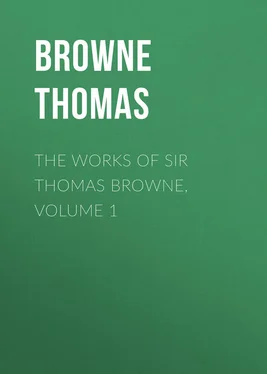Thomas Browne - The Works of Sir Thomas Browne, Volume 1
Здесь есть возможность читать онлайн «Thomas Browne - The Works of Sir Thomas Browne, Volume 1» — ознакомительный отрывок электронной книги совершенно бесплатно, а после прочтения отрывка купить полную версию. В некоторых случаях можно слушать аудио, скачать через торрент в формате fb2 и присутствует краткое содержание. ISBN: , Жанр: foreign_antique, foreign_prose, на английском языке. Описание произведения, (предисловие) а так же отзывы посетителей доступны на портале библиотеки ЛибКат.
- Название:The Works of Sir Thomas Browne, Volume 1
- Автор:
- Жанр:
- Год:неизвестен
- ISBN:http://www.gutenberg.org/ebooks/39960
- Рейтинг книги:5 / 5. Голосов: 1
-
Избранное:Добавить в избранное
- Отзывы:
-
Ваша оценка:
- 100
- 1
- 2
- 3
- 4
- 5
The Works of Sir Thomas Browne, Volume 1: краткое содержание, описание и аннотация
Предлагаем к чтению аннотацию, описание, краткое содержание или предисловие (зависит от того, что написал сам автор книги «The Works of Sir Thomas Browne, Volume 1»). Если вы не нашли необходимую информацию о книге — напишите в комментариях, мы постараемся отыскать её.
The Works of Sir Thomas Browne, Volume 1 — читать онлайн ознакомительный отрывок
Ниже представлен текст книги, разбитый по страницам. Система сохранения места последней прочитанной страницы, позволяет с удобством читать онлайн бесплатно книгу «The Works of Sir Thomas Browne, Volume 1», без необходимости каждый раз заново искать на чём Вы остановились. Поставьте закладку, и сможете в любой момент перейти на страницу, на которой закончили чтение.
Интервал:
Закладка:
The Scepticks that affirmed they knew nothing. ] The ancient Philosophers are divided into three sorts, Dogmatici , Academici , Sceptici ; the first were those that delivered their opinions positively; the second left a liberty of disputing pro et contra ; the third declared that there was no knowledge of any thing, no not of this very proposition, that there is no knowledge, according to that,
– Nihil sciri siquis putat, id quoq; nescit
An sciri possit, quod se nil scire fatetur.
The Duke of Venice that weds himself to the Sea by a Ring of Gold, etc. ] The Duke and Senate yearly on Ascension-day use to go in their best attire to the Haven of Lido , and there by throwing a Ring into the water, do take the Sea as their spouse. Vid. Hist. Ital. by Will Thomas Cambrobrit . Busbequius reports that there is a custom amongst the Turks, which they took from the Greek Priests, not much unlike unto this. Cum Græcorum sacerdotibus mos sit certo veris tempore aquas consecrando mare clausum veluti reserare, ante quod tempus non facile se committunt fluctibus; ab ea Ceremonia nec Turcæ absunt. Busb. Ep. 3. legat. Tursic.
But the Philosopher that threw his money into the Sea, to avoid avarice, etc. ] This was Apollonius Thyaneus , who threw a great quantity of Gold into the Sea with these words, Pessundo divitias, ne pessundarem ab illis . Polycrates the Tyrant of Samos cast the best Jewel he had into the Sea, that thereby he might learn to compose himself against the vicissitude of Fortune.
There go so many circumstances to piece up one good action. ] To make an action to be good, all the causes that concur must be good; but one bad amongst many good ones, is enough to make it vitious, according to the rule, Bonum ex causa integra, malum ex partiali .
Sect. 56. Pag. 78.
The vulgarity of those judgements that wrap the Church of God in Strabo's Cloak, and restrain it unto Europe. ] 'Tis Strabonis tunica in the translation, but Chalmydi would do better, which is the proper expression of the word that Strabo useth: it is not Europe , but the known part of the world that Strabo resembleth to a Cloak, and that is it the Author here alludeth to; but we have no reason to think that the resemblance of Strabo is very proper, Vid. Sir Hen. Savil. in not. ad Tac. in vita Agricolæ .
Sect. 57. Pag. 79.
Those who upon a rigid Application of the Law, sentence Solomon unto damnation, etc. ] St. Aug. upon Psal. 126. and in many other places, holds that Solomon is damned. Of the same opinion is Lyra , in 2 Reg. c. 7. and Bellarm. 1 Tom. lib. 1. Controv. c. 5.
Sect. 1. Pag. 83.
I wonder not at the French for their Frogs, Snails and Toad-stools. ] Toad-stools are not peculiar to the French ; they were a great delicacy among the Romans , as appears every where in Martial . It was conceived the Emperor Claudius received his death by Poyson, which he took in Mushroom. Suet. and Tac.
Sect. 2. Pag. 87.
How among so many millions of faces, there should be none alike. ] It is reported there have been some so much alike, that they could not be distinguished; as King Antiochus , and one Antemon , a Plebeian of Syria , were so much alike, that Laodice , the Kings widow, by pretending this man was the King, dissembled the death of the King so long, till according to her own mind, a Successor was chosen. Cn. Pompeius , and one Vibius the Orator; C. Plancus , and Rubrius the Stage-player; Cassius Severus the Orator, and one Mirmello ; M. Messala Censorius , and one Menogenes , were so much alike, that unless it were by their habit, they could not be distinguished: but this you must take upon the Faith of Pliny ( lib. 7. c. 12. ) and Solinus , ( cap. 6. ) who as this Author tells elsewhere, are Authors not very infallible.
Sect. 3. Pag. 89.
What a βατροχομυομαχία and hot skirmish is betwixt S. and T. in Lucian. ] In his Dialog. judicium vocalium , where there is a large Oration made to the Vowels, being Judges, by Sigma against Tau , complaining that Tau has bereaved him of many words, which should begin with Sigma .
Their Tongues are sharper than Actius his razor. ] Actius Navius was chief Augur, who (as the story saith) admonishing Tarqu. Priscus that he should not undertake any action of moment, without first consulting the Augur, the King (shewing that he had little faith in his skill) demanded of him, whether by the rules of his skill, what he had conceived in his mind might be done: to whom when Actius had answered it might be done, he bid him take a Whetstone which he had in his hand, and cut it in two with a Razor; which accordingly the Augur did. Livy. And therefore we must conceive it was very sharp. Here the Adage was cross'd, ξυρὸς εἰς ἀκόνην, i.e. novacula in cotem. Vid. Erasm. Chiliad .
Pag. 90.
It is not meer Zeal to Learning, or devotion to the Muses, that wiser Princes Patronize the Arts, etc. but a desire to have their names eterniz'd by the memory of their Writings. ] There is a great Scholar, who took the boldness to tell a Prince so much. Est enim bonorum principum cum viris eruditis tacita quædam naturalisque Societas, ut alteri ab alteris illustrentur, ac dum sibi mutuo suffragantur, et gloria principibus, et doctis authoritas concilietur . Politian. Ep. Ludovic. Sfort. quæ extat, lib. 11. Ep. ep. 1 . And to this Opinion astipulates a Country man of our own, whose words are these: Ignotus esset Lucilius, nisi eum Epistolæ Senecæ illustrarent. Laudibus Cæsareis plus Virgilius et Varus Lucanusq; adjecerunt, quam immensum illud ærarium quo urbem et orbem spoliavit. Nemo prudentiam Ithaci aut Pelidæ vires agnosceret, nisi eas Homerus divino publicasset ingenio: unde nihil mihi videtur consultius viro ad gloriam properanti fidelium favore scriptorum. Joan. Sarisb. Polycrat. l 8. c. 14 . And that Princes are as much beholding to the Poets Pens as their own Swords, Horace tells Censorinus with great confidence. Od. 8. l. 4. Non incisa notis , etc.
Sect. 4. Pag. 90.
St. Paul that calls the Cretians Lyars, doth it but indirectly, and upon quotation of one of their own Poets. ] That is, Epimenides ; the place is Tit. 1. v. 12. where Paul useth this verse, taken out of Epimenides .
It is as bloody a thought in one way, as Nero's was in another. For by a word we wound a thousand. ] I suppose he alludes to that passage in Sueton. in the life of Nero , where he relates that a certain person upon a time, spoke in his hearing these words, i. e. When I am dead let Earth be mingled with Fire. Whereupon the Emperour uttered these words, Ἐμοῦ ζῶντος, i. e. Yea whilst I live : there by one word, he express'd a cruel thought, which I think is the thing he meant; this is more cruel than the wish of Caligula , that the people of Rome had but one Neck, that he might destroy them all at a blow.
Читать дальшеИнтервал:
Закладка:
Похожие книги на «The Works of Sir Thomas Browne, Volume 1»
Представляем Вашему вниманию похожие книги на «The Works of Sir Thomas Browne, Volume 1» списком для выбора. Мы отобрали схожую по названию и смыслу литературу в надежде предоставить читателям больше вариантов отыскать новые, интересные, ещё непрочитанные произведения.
Обсуждение, отзывы о книге «The Works of Sir Thomas Browne, Volume 1» и просто собственные мнения читателей. Оставьте ваши комментарии, напишите, что Вы думаете о произведении, его смысле или главных героях. Укажите что конкретно понравилось, а что нет, и почему Вы так считаете.












